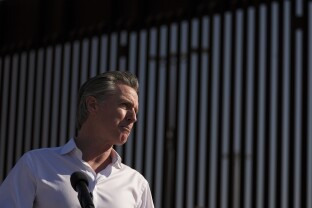Gov. Gavin Newsom is pushing California municipalities to ban homeless encampments, saying Monday it’s time to take steps that let the public “see results.”
Newsom issued a model ordinance that municipalities can adopt to ban homeless encampments on public property, the latest rightward step the governor has taken on housing issues. Newsom, a prominent Democratic figure and potential 2028 presidential candidate, has spent the last few years trying to stake himself to the right of most of his fellow Democrats on several issues, including this one.
“It’s not human to allow people to live three, four, five years in encampments. It’s not human to allow the status quo to continue,” Newsom told reporters Monday during a press conference where he said the measures he proposed reflect a “deeper sense of clarity” between state and local efforts to address the homelessness crisis in California.
The model ordinance, which includes citations or arrest as possible consequences for those who violate the ban, is not an executive order. Instead, localities would need to implement it themselves. Newsom also announced $3.3 billion to help fund mental health and homelessness solutions.
Last year California voters approved more than $6 billion in funding to build additional mental health facilities and homeless shelters in the state. On Monday, Newsom also called on local governments to streamline their permitting processes to speed up the building of these facilities.
Lawmakers and housing advocates were still trying to understand the governor’s proposal, and some of them expressed alarm at what this could mean for their state’s homeless people. California has an outsized unsheltered population, with nearly 187,000 homeless people across the state, according to the Public Policy Institute of California.
Dennis Oleesky, interim CEO of Los Angeles Mission, a nonprofit faith-based organization focused on homelessness, said Newsom’s model ordinance “leans heavily on enforcement without offering sufficient guarantees that real housing or services will be in place before people are displaced.”
“Yes, the ordinance includes language about offering shelter and services — but we’ve seen that those offers often amount to temporary fixes: a mat on a floor for one night, or a referral to a shelter that’s already full,” Oleesky said in a statement to NOTUS. “There’s no meaningful path to permanence for most people being displaced, and unless that’s addressed, this policy risks being a revolving door of disruption rather than a real solution.”
Sen. Alex Padilla, who told NOTUS he was just learning about the push to crack down on encampments, said he felt a combination of approaches would be necessary to cut down on homelessness.
“We should be doing everything we can to help get people off the street, but that includes doing everything we can to get people the treatment they need if they’re suffering from a mental illness,” Padilla told NOTUS.
Sen. Adam Schiff, who also said he was just learning of Newsom’s recommendations, told NOTUS that while he doesn’t want to see Democrats “criminalizing homelessness,” he also feels homeless people have a right to a safe environment.
“We first need to make sure that there are beds available in shelters, but if there are available spaces, I think a city has the right to make sure that people can walk down their sidewalk, that businesses can make sure customers can enter their buildings without stepping over people, and we protect against debris that can pose a health and fire risk,” Schiff told NOTUS.
Midnight Mission, the oldest continuously operating homeless outreach organization in Los Angeles, which primarily serves Skid Row, told NOTUS it is “still learning more about Governor Newsom’s new mandate on homeless encampments, we are committed to continuing our work and helping those who need it most.”
“There is still much that remains unclear regarding the full impact of this policy, and we will be closely monitoring developments as they unfold,” Georgia Berkovich, chief communications officer at Midnight Mission, said in an email to NOTUS.
This push is not the first sign of Newsom’s rightward shift on homelessness. The California governor has distributed $3.2 billion to help localities clear encampments since taking office, Newsom said at a press conference last year, and has a history of temporarily withholding funds for not clearing encampments.
Last year, Newsom doubled down his efforts to use his executive power in an effort to radically decrease homeless encampments in California, an effort that has attracted criticism from homeless advocacy groups and some Democratic-run cities like Los Angeles.
Last summer, when the Supreme Court ruled that cities have the right to criminally prosecute people for sleeping in public spaces, Newsom supported the decision. He then issued an executive order mandating every state agency clear homeless encampments on state property.
—
Amelia Benavides-Colón and Samuel Larreal are NOTUS reporters and Allbritton Journalism Institute fellows.
Sign in
Log into your free account with your email. Don’t have one?
Check your email for a one-time code.
We sent a 4-digit code to . Enter the pin to confirm your account.
New code will be available in 1:00
Let’s try this again.
We encountered an error with the passcode sent to . Please reenter your email.


